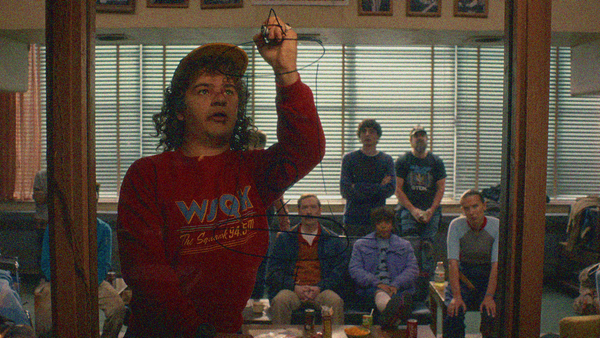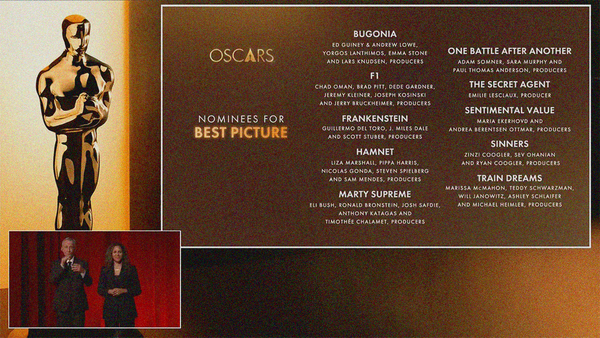Week Ending 5/16/25
We brought it back with us.
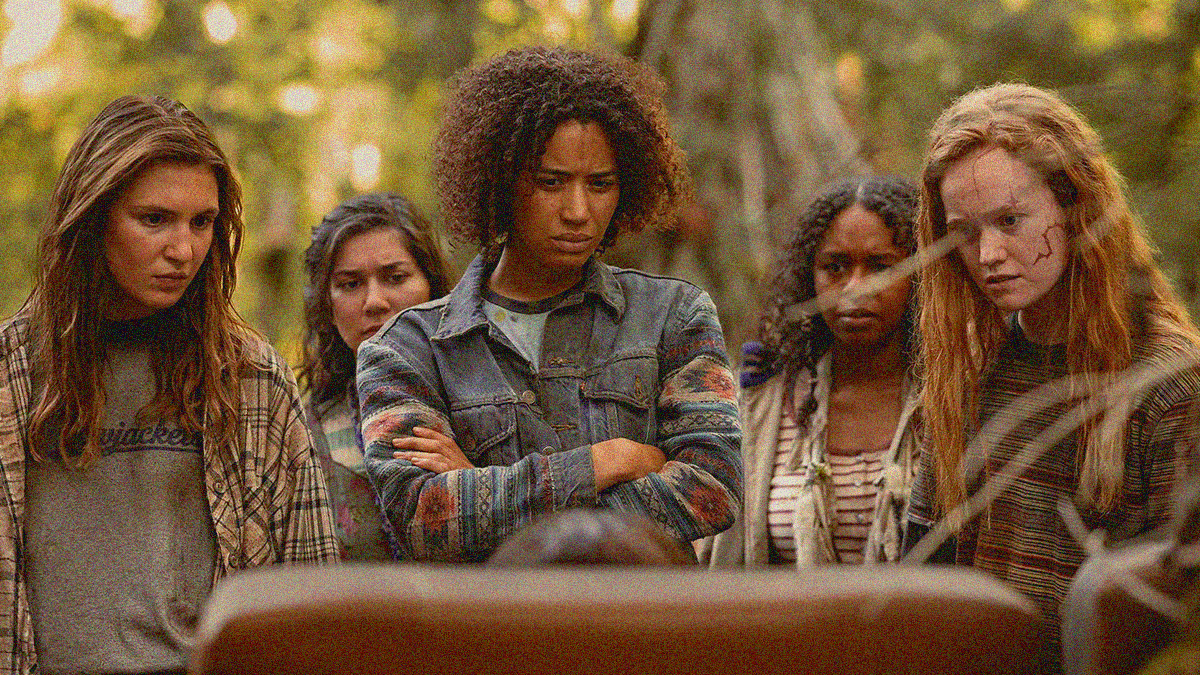
Considering the only thing I really knew about “Yellowjackets” was that it was the “cannibal soccer team” show, I had zero expectations going in. So, seeing it deal in flashbacks while also including a might-be-supernatural-or-might-be-psychological mystery couldn’t help conjuring ideas of a “Lost” redux … for better and worse.
That the origins of the mystery didn’t rear its head until the tail-end of season one, however, had me wondering what the point of the show was at all. It’s stated right away that they were gone nineteen months before being rescued, so it wasn’t a crazy amount of time. And the present is set twenty-five years later, so the survivors have all led lives outside trauma’s shadow. Was the whole thing going to be about their obvious cannibalism secret (revealed in the opener)? Would that be used to mine their interior lives?
Part of me wants to say I wish that was what the show would become because the fifteen episodes I’ve watched so far do very little mining outside of what the writers need to progress to the next mystery-focused morsel. The other part is glad to have the specter of evil via the trees, eyeless man, and “the bad one” because there’s comfort in the empty entertainment of watching for the next salacious detail in these girls’ and women’s lives.
After all, the true draw is the cast. I get that a lot of the young actors weren’t necessarily stars when the show began, but many are now (partly due to its success). To then add stalwarts like Melanie Lynskey, Juliette Lewis, Christina Ricci, and Tawny Cypress before expanding the roster to include Simone Kessell and Lauren Ambrose only ups the ante budget-wise going forward. Once Elijah Wood showed up, I had to question whether they can afford to finish the story.
Am I invested in what happens? No. But I do like the parallel lines of the kids discovering a presence in the woods just as the adults start to wonder if it followed them out, lying dormant until being woken it up. Ricci and Wood are a blast. Lynskey, Lewis, and Cypress are each unpredictable enough to keep things interesting. And I do want to see if Ashley Lyle and Bart Nickerson have a destination. Because the plot propulsion is just slow enough to feasibly be both a byproduct of writing things as they go or purposefully milking an endgame for job security.
What I Watched:
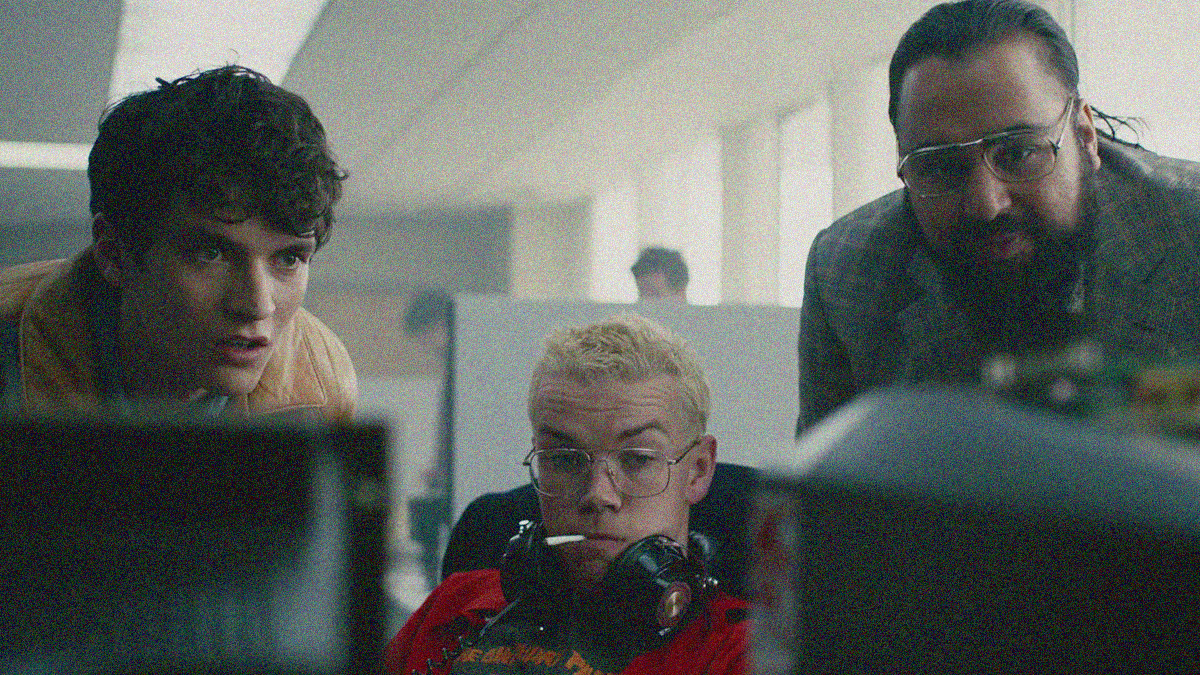
BLACK MIRROR: BANDERSNATCH
(deleted from Netflix on 5/12/25)
In typical "me" fashion, I forgot about the "Black Mirror" choose your own adventure episode Bandersnatch. My whole concept of subscribing to Netflix—at least in its pre-COVID era—was paying for the ability to watch their original productions whenever I wanted. And, often, I used that sense of permanence to just never watch any of them.
Well, if Disney and Warner Bros. hadn't already broken that illusion by pulling and/or shelving their own titles post-2020, Netflix is now also proving me wrong by officially shuttering its interactive arm in order to focus their platform's resources on gaming. So, why not just make Bandersnatch available as a point-and-click game within that tab? What a perfect evolution for its meta game narrative. Who knows? Maybe they still will.
Regardless, I had fun with this and believe it deserves to be saved in some capacity. The first half is a bit rudimentary with small choices that seemingly do little besides selecting the soundtrack or triggering a cereal commercial later on, but the idea that we as the viewers don't really have control is a purposeful one. The plot demands we do it over and do it "right." Because we aren't creating the story. We're simply bouncing between its multiversal timelines.
Our goal: to earn Stefan Butler's (Fionn Whitehead) debut video game adaptation a perfect score from its 1984 television critic (Paul Michael Bradley). The saner choices you make, the greater the opportunity of never finishing the code and either being prompted to go back and try again or simply witness a bastardized version get trashed. The more insane choices you make, the greater chance your fate will follow that of the in-movie Bandersnatch's author Jerome F. Davies. One of dark, murderous horrors that inevitably channel Stefan's creative genius.
All those visual cues (like Craig Parkinson's Dad always locking his bedroom door) get payoff somewhere in the skip logic if you're willing to find them. Will Poulter's Colin Ritman (Stefan's idol) seems to know more of what's going on than he should for a reason (both drug and physics related). And you should definitely take a spin down the "Netflix" logo option when it arrives to finally understand why they cast Alice Lowe as an otherwise straightforward psychiatrist. I only wish writer Charlie Brooker and director David Slade took more big swings like that (I say having only watched about 120 minutes of the full 312).
Well, I guess I shouldn't tell you to do anything since you no longer can. At least not on our current "shareholders don't care about financing art since art is just the monetized content they produce to earn enough profit for a yacht" timeline. Maybe Netflix CEO Ted Sarandos will take some LSD and jump off a balcony a la Brooker's characters to reset our existence onto another reality where its Emmy-winning phenomenon becomes available once again.
- 7/10
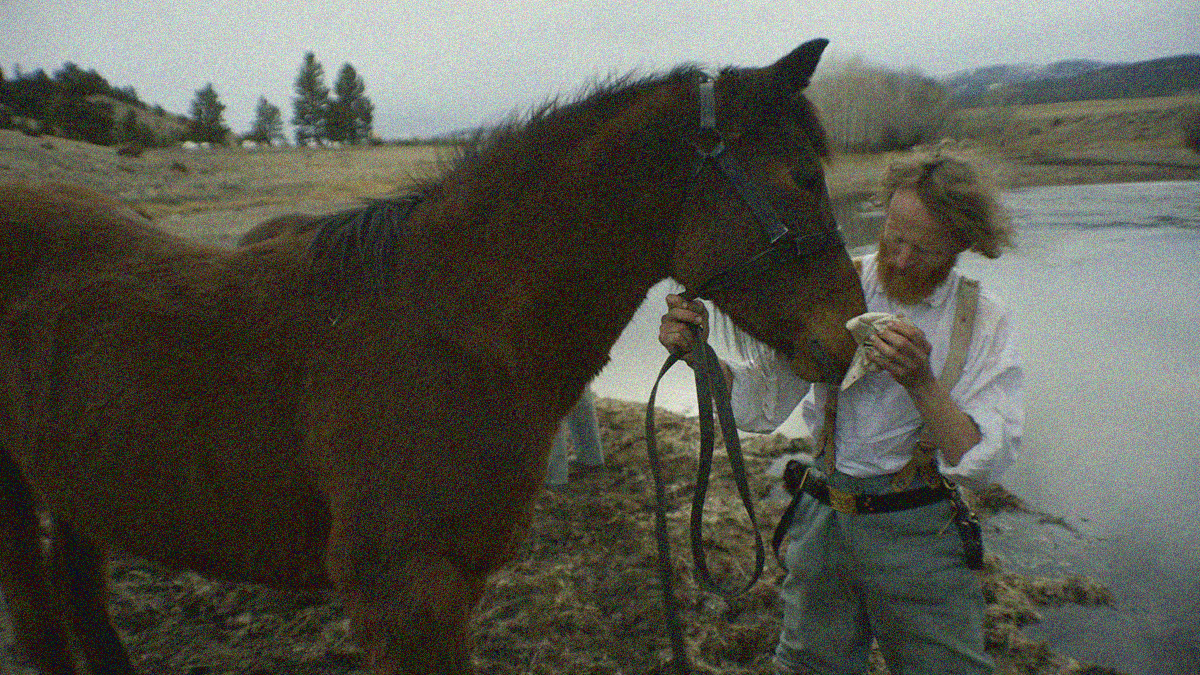
THE DAMNED
(limited theaters)
Documentarian Roberto Minervini steps into the fictional narrative sector with Civil War drama The Damned by pretty much setting up an historical reenactment and shooting it like a documentary.
It's winter, 1862 and a contingent of Union volunteers have been dispatched to patrol the uncharted western United States in case any Confederate soldiers were making their way north to set-up camps or move east for an attack. Led by their sergeant (Tim Carlson), these men search the ridges and talk about their guns to pass the time. They hope to be ready once shots are fired.
Jeremiah Knupp's scout proves the de facto lead. He only joined the war six months prior, but knows his way around the plains and a rifle. He engages with crack shot Cuyler Ballenger and the reliable René W. Solomon as tensions escalate into a firefight about forty minutes in. From there, these four (and one of the sergeant's sons, played by Noah Carlson) head out to carve a path to higher ground and extend their line. More conversations are had. More existential crises are confronted.
And that's the film. The drama hinges on the uncertainty of whether Confederate soldiers will arrive. The narrative balances upon a collection of intriguing debates about God's place in war, boys becoming men, family versus country, and survival first. We never really get to know who these men are beyond their archetypes or see where they're going (unless one tragically dies on-screen), but we begin to learn about the psychology of soldiers through them.
These are Civil War dudes doing Civil War things without any real grasp on why they're fighting beyond admittedly hollow ideals of duty or bravery. It's mankind's fear amidst the beauty of nature with mortality hanging by a thread. Some will be bored to tears. Others will embrace the philosophical undertones born from their realization that participation all but ensures their demise. Maybe not physically on the battlefield, but emotionally in their souls.
- 6/10
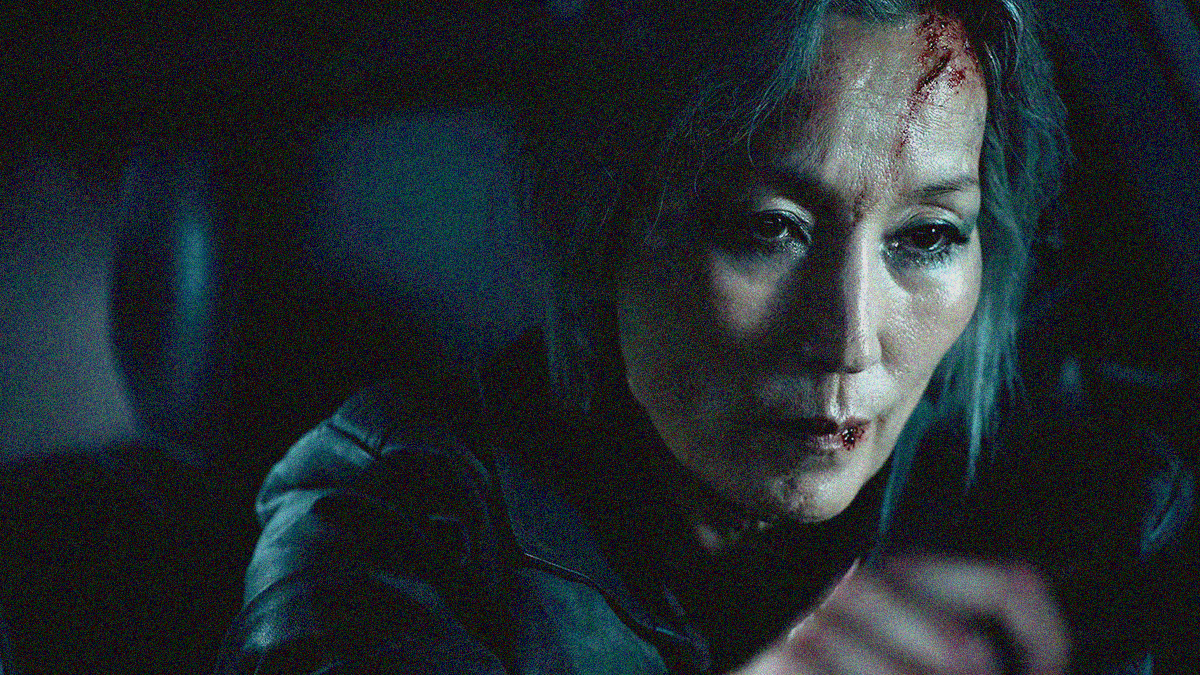
THE OLD WOMAN WITH THE KNIFE
(limited theaters)
We first meet Hornclaw (Shin Si-ah) half frozen and covered in snow on the side of the road in 1975. If not for Ryu (Kim Mu-yeol) stopping to save her, she'd be dead at sixteen. But that's what he does, taking her to the restaurant he and his wife own to thaw her out and offer a job. They can't afford to pay a salary, but they can give her a place to stay and food to eat. And, eventually, a vocation unlike any she could have imagined.
Fast-forward to present-day and Hornclaw (Lee Hye-yeong) is now in her sixties—an aging assassin revered as "Godmother" by her peers. The respect they've held for her, however, has recently begun to wane. Not because she hasn't remained a formidable force despite her declining health, but because she still holds true to the code of rules Ryu instilled all those years ago. Whereas the new guard sees their occupation as a means for profit, she maintains the ethos that they kill "insects" to save the world. They laugh because she still refuses to let emotions cloud her judgement. She scoffs because they always let politics cloud theirs.
Kyu-dong Min's The Old Woman with the Knife (co-adapted with Kim Dong-wan from author Gu Byeong-mo's novel) isn't your usual origin tale. Yes, we meet her as a teenager and witness her first kill before going back every now and then for added context, but that origin takes a backseat to the rebirth that this film actual depicts. Those flashbacks are but a means to show us why Hornclaw became who she became and why she's yet to retire. It's her current actions that reveal whether she'll accept that the job has finally passed her by or teach her co-workers that they've gone too far astray for her not to intervene.
It's also the origin story of the character that ultimately pushes Hornclaw to make this decision: Kim Sung-cheol's Bullfight. Because he's not just the new psychopath on the beat holding a mirror up to what he believes is her own hypocrisy once she chooses to protect a potential witness (Yeon Woo-jin's Dr. Kang) instead of dispatching him like her own rules demand. He's also a figure from her past looking to balance a scale he believes has been tipped against him. Bullfight's actions are thus very personal and, as a result, playfully cruel since it's not solely a matter of payback. He needs her to remember what she did.
It seems like way too much for one feature-length script coming in at just above two hours, but Min and Kim do well to distill it down and ensure everything folds into each other. We must know Hornclaw's past with Ryu to understand her tenuous place in the present. We must know her emotional connection to Kang to understand Bullfight's rage. And we must learn Bullfight's past to understand how these two killers are the same except for the fact that Ryu still had enough heart to save her when they met while Hornclaw's had already died before meeting him.
The underlying message is therefore one that asks us to question the sustainability and success of being a cold-blooded killer. Yes, it allows Hornclaw the ability to charge into suicide-level situations with the confidence to finish the job and ensure no evidence ties her to the crime, but it also runs counter to Ryu's mission of killing for "good." If you aren't willing to open yourself up to protecting an innocent person who's guilty of nothing but being in the wrong place at the wrong time, how do you stop yourself from becoming the exact sort of "insect" you've prided yourself on exterminating?
That's the conundrum that makes The Old Woman with the Knife so compelling. It's not about whether Hornclaw lives to fight (or not fight) another day. It's about whether she'll find the strength to refocus the mission. It's about discovering whether Bullfight's unforgiving plan to destroy her will push her further away or shake her awake to stop the slide apathy introduced. Real-life people who are good at a job so often get promoted to managerial positions they're ill-equipped to handle that it's refreshing when someone like Hornclaw is actually perfectly suited to guide a team precisely because of her job experience. Here's someone who doesn't want to lead but must to protect their objective.
Beyond a full-blown one-woman-against-a-team-of-mercenaries climactic encounter leading to the inevitable showdown between Hornclaw and Bullfight, the action is mostly quiet and covert. These are operatives hired to do a job who are smart enough to do so without getting caught ... unless their guilt gets in the way. So, it's mainly cat-and-mouse chases, precise hits, and close shaves—either intentional via a conscious desire to not choose violence or unintentional via elaborate games meant to turn the pursuer into the pursued. It's new blood (Bullfight and young Hornclaw) plowing through and old blood (old Hornclaw) holding on despite the punishment from being a step too slow.
Lee Hye-yeong plays the latter perfectly with her smarts just barely proving enough to overcome her newfound physical liabilities. She's a bad ass struggling with the fact her desire to reclaim purpose comes into conflict with the legend that's kept her in power. Outsiders see it as weakness (much like she and Ryu did after an unspeakable tragedy), but it's really her greatest strength. That indelible part of her that allows someone like Kang to know in his heart that she's a "good person" regardless of his correct assumptions about her occupation. It's also why Kim Sung-cheol's Bullfight is so interesting. This supposed "lapse" is what supplies him his opening, but it's also what he wished for from her decades ago.
Those intricate connections are what makes Min's film great. It's not action loosely tied together by a generic plot. It's a captivating narrative augmented by its action. That's the difference between telling a story about killers and one about people who just so happen to be killers. Their humanity (or lack thereof) is what drives them and the act of not killing becomes just as important as the act of killing in process. Not because Hornclaw's salvation is tied to getting out of the life, but because it's tied to remembering why she got into it in the first place.
- 8/10
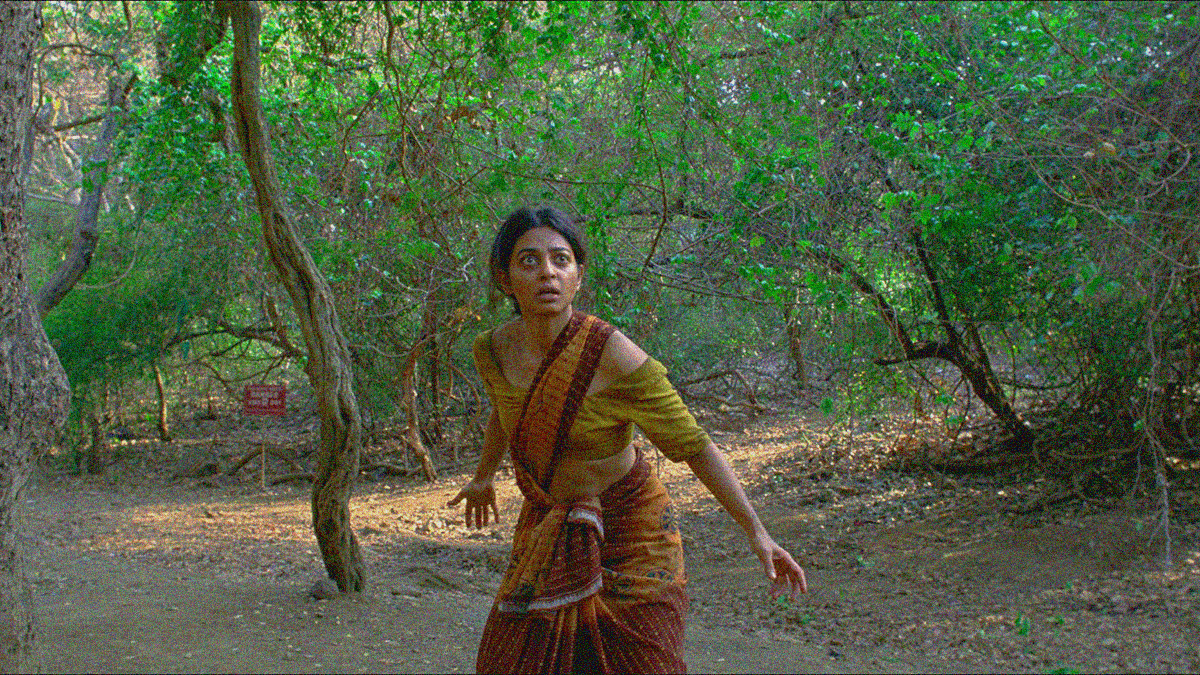
SISTER MIDNIGHT
(limited theaters)
First-time feature film director Karan Kandhari's Sister Midnight is all over the place—both intentionally so and to its benefit. Because the start is like any other newlywed drama of uncertainty. Two people in an arranged marriage who knew each other as kids, but not really. They sit in silence on the train ride home before, upon arriving at their new shared home, she welcomes his touch only for him to curl in bed so as not to touch her. So, when Uma (Radhika Apte) wakes the next morning to find Gopal (Ashok Pathak) gone (leaving her without food or money), she's frustrated. When he doesn't return home until after dark only to pass out on the floor, she's enraged.
This is the point where we start to get a feel for Kandhari's comic sensibilities. Things are still pretty much by the book as far as miscommunications, awkwardness, and mistakes (Uma wonders aloud if her husband is dumb or just selfish), but the dead-pan tone of the whole's mix of silent film-esque facial and body expressions with Wes Anderson-esque reaction shots and pans begin to inject a uniquely off-kilter sensibility. That's when Uma decides to reject her presumed role of domesticity and accept a paid role of domesticity at a job that takes a four-hour walk to attend. Anything to avoid being in that house with the deafening silence and uncertainty marriage has wrought.
Kandhari isn't done there, though. Yes, him giving Uma the room to let her take-no-prisoners personality out gives us something to sink our teeth into after the oppressive repetition of Gopal letting her down and Chhaya Kadam's Sheetal (their neighbor) constantly revealing how things won't get better as much as they just become routine. But we still need something akin to a purpose or an endgame for the narrative. Rather than turn their evolving (or devolving) union into that linchpin like most relationship dramedies, Kandhari instead focuses on Uma and Gopal's inability to conform. Because if they have anything in common, it's that. If he ever found the courage to engage with her, they might even fall in love.
How that non-conformity evolves skirts with horror tropes that I'll merely allude to with the facts that Uma becomes sickly white to the point women on the street want to know her "whitening" regimen and goats and birds start to chase her (often via what looks to be stop motion animation) despite winding up dead (and undead) for their trouble. Regardless of what's going on, hers and Gopal's status as pariahs rapidly crescendos to mob levels of fear and hate. They don't necessarily help their cause by continuing to act oddly and, at times, aggressively, but is it their responsibility to satisfy the community's desires or the community's responsibility to mind its own business?
The back half of Sister Midnight unfolds at a fast pace—perhaps even too fast to fully keep up with everything happening. I think that's kind of the point as Kandhari is all about idiosyncratic juxtapositions with his soundtrack choices, use of animation without any desire of hiding the technique, and dry humor in traditionally dark, dramatic scenarios. Uma is desperately trying to find her footing as her very identity shifts in rejection of society's demands. She cannot adjust to being a homemaking or the noise and chaos of the day or the malaise of being married to a stranger who doesn't know how to not be alone. So, she gets a job, exists in the quiet of night, and leaves Gopal to his own devices ... until she's ready to share her new self with him.
Will it be a successful coming out party that leads to a happily ever after? Or is the "curse" afflicting her destined to keep taking and taking until Uma agrees to cut ties with every last vestige of her former self? The answer is a little bit of both since success doesn't automatically erase the potential for destruction's arrival anyway. And Apte entertainingly embraces the challenge with a headstrong attitude that delights in both her refusal of subservience and uncertainty to fully give into what's happening. Whereas an American coming-of-age-through-horror tale would occur during college, a traditional lens through Indian culture puts it around the same age via marriage.
From being stuck in her parents' shadow to that of her husband, Uma simply wants to find herself. It's a strange, chaotic journey to clarity with as many people wanting to help her find that path as those attempting to block it (you might be surprised where Gopal falls). And while those in the latter camp are always operating out of fear, there's as many who believe her to be a witch as those who wonder if she's a God. It's that sort of all or nothing attitude that seeks to erase those of us who merely seek to exist in the middle—to be happy on our own terms. Not miserable and alone or miserable amongst friends, but empowered and unbeholden to anyone. It's a reinvention that's worth the mess.
- 7/10
Cinematic F-Bombs:
This week saw Bart Got a Room (2009), Brighton Beach Memoirs (1986), Ground Control (1999), The Guardian (2006), Let It Be (1970), New Year's Eve (2011), Ride Along (2014), Ride Along 2 (2016), Scavenger Hunt (1979), and Sing Street (2016) added to the archive (cinematicfbombs.com).
Jack Reynor dropping an impassioned f-bomb in Sing Street.
New Releases This Week:
(Review links where applicable)
Opening Buffalo-area theaters 5/16/25 -
- 23 - Iravai Moodu at Regal Elmwood
- DD Next Level at Regal Elmwood
- Final Destination Bloodlines at Dipson Amherst, Flix, Capitol; AMC Maple Ridge, Market Arcade; Regal Elmwood, Transit, Galleria, Quaker
- Hurry Up Tomorrow at AMC Maple Ridge, Market Arcade; Regal Elmwood, Transit, Galleria, Quaker
- Maaman at Regal Elmwood
- The Ruse at Regal Elmwood, Quaker
- Shaunki Sardar at Regal Elmwood
- #Single at Regal Elmwood
Streaming from 5/16/25 -
Armand – AMC+ on 5/16
“Armand is distilling mankind’s penchant for baseless attacks and fear-mongering down into the interaction of three distinct entities in a familiarly simple scenario.” – Full thoughts on HHYS.
Deaf President Now! – AppleTV+ on 5/16
The Brutalist – Max on 5/16
“Above the script's elucidations, Corbet's assured direction, and the impressive production design, though, are too of the year's finest performances courtesy of Adrien Brody and Guy Pearce.” – Full thoughts at jaredmobarak.com.
The Quilters – Netflix on 5/16
I’m Still Here – Netflix on 5/17
“And it all hinges on Torres being able to pull off the internal emotional struggle to keep moving forward no matter what she discovers. Eunice is a woman who cannot afford to break.” – Full thoughts at jaredmobarak.com.
Untold: The Fall of Favre – Netflix on 5/20
Vermiglio – Criterion Channel on 5/20
Quick thoughts at jaredmobarak.com.
Now on VOD/Digital HD -
Bridget Jones: Mad About the Boy (5/13)
The Darkside of Society (5/13)
The Featherweight (5/13)
A Minecraft Movie (5/13)
Snow White (5/13)
The Wedding Banquet (5/13)
“The true highlights are Youn and Chen. Comedic timing, poignant pathos, and an authentic understanding in how they learn and grow to be what Min and Angela need ... even if it took them longer than it should.” – Full thoughts at The Film Stage.
A Breed Apart (5/16)
Desert Dawn (5/16)
Thanks for reading Hey, have you seen ...?! Subscribe for free to receive new posts and support my work.

